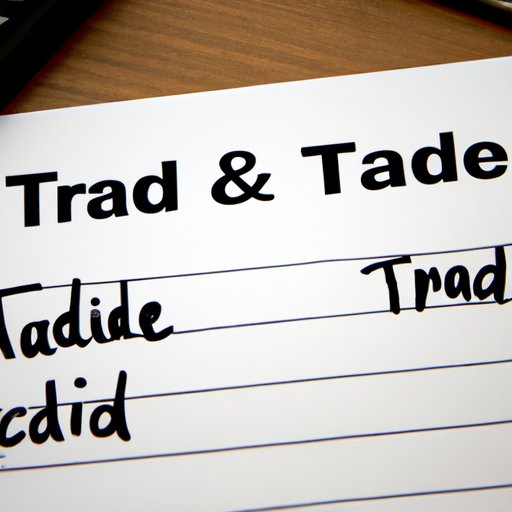Introduction
Trading in a car can be a great way to upgrade to something new without having to deal with selling it privately. However, there are many factors to consider when making this decision. This article will explore the advantages and disadvantages of trading in a car, examine the current market conditions for used cars, compare the cost of trading in a car versus selling it privately, and provide strategies to maximize trade-in value.

Analyzing the Current Market Conditions for Used Cars
When considering the option to trade in a car, it’s important to understand the current market conditions for used vehicles. The amount of money a dealer is willing to offer for a trade-in depends on several factors, including age and mileage, vehicle condition, popularity of the model, and local market demand.
Factors Affecting Trade-In Value
Here are some of the key factors that can impact the trade-in value of a car:
- Age and Mileage: Generally speaking, the older the car and the higher the mileage, the lower the trade-in value.
- Vehicle Condition: If a car has been well-maintained and is in good condition, it will typically fetch a higher trade-in value than one that has not been taken care of properly.
- Popularity of Model: Popular models tend to have higher trade-in values than less popular ones.
- Local Market Demand: The availability of similar vehicles in the local market can affect the trade-in value of a car.
Strategies to Maximize Trade-In Value
There are several steps you can take to maximize the trade-in value of your car:
- Cleaning and Detailing: A thorough cleaning and detailing job can help make your car look its best and attract a higher trade-in value.
- Upgrading Features: Adding features such as a new sound system or upgraded wheels can help increase the value of your car.
- Selling Accessories Separately: Selling any accessories separately can add extra money to your trade-in value.

Comparing the Cost of Trading in a Car Versus Selling it Privately
Another important factor to consider is the cost of trading in a car versus selling it privately. There are both advantages and disadvantages to each option.
Advantages of Trading In
The main advantage of trading in a car is convenience. You don’t have to worry about advertising, negotiating with potential buyers, or dealing with paperwork. Additionally, trading in a car eliminates the risk of being scammed by someone who may not have the funds to purchase the vehicle. Finally, trading in a car involves fewer negotiations, as the dealer will usually offer a set price.
Disadvantages of Trading In
On the other hand, the main disadvantage of trading in a car is that you won’t get as much money for it as you would if you sold it privately. Additionally, dealers often charge additional fees, such as a “convenience fee” or “processing fee.”

Exploring the Pros and Cons of Trading in a Car Versus Keeping It
Trading in a car versus keeping it is another important consideration. Here are some of the benefits and drawbacks of trading in a car:
Benefits of Trading In
One of the main advantages of trading in a car is that it’s easier to upgrade to something newer. Additionally, dealers often offer financial incentives for trading in a car, such as low-interest financing or cash back. Finally, trading in a car can improve safety, as newer models tend to have more advanced safety features.
Downsides of Trading In
One of the main downsides of trading in a car is that you lose the equity you’ve built up. Additionally, trading in a car will result in some degree of depreciation, depending on the age and condition of the vehicle. Finally, you may end up spending more on maintenance costs if you choose to trade in a car.
Investigate the Best Strategies for Getting the Most Out of a Trade-In Transaction
If you decide to trade in a car, there are certain strategies you can use to get the most out of the transaction. Here are some tips to keep in mind:
Research the Market
Before trading in a car, it’s important to research the current market conditions. Compare prices for similar models and read reviews to get an idea of what dealers are offering. Additionally, you can search online classifieds to see what other people are asking for their vehicles.
Negotiate with Dealers
Once you’ve done your research, it’s time to start negotiating with dealers. Obtain multiple offers from different dealers and leverage your options to get the best possible deal. Be sure to ask questions and understand all the terms and conditions before signing anything.
Examine the Financial Implications of Trading in a Car
Finally, it’s important to understand the financial implications of trading in a car. Depending on the age and condition of the vehicle, you may experience some degree of depreciation. Additionally, there may be taxes and fees associated with the transaction.
Conclusion
Trading in a car can be a great way to upgrade to something new without having to deal with the hassle of selling it privately. However, there are several factors to consider, including analyzing the current market conditions, assessing cost comparisons, exploring financial implications, and investing in strategies to maximize trade-in value. Ultimately, the decision to trade in a car should be based on individual needs and preferences.
In conclusion, trading in a car can be a great way to upgrade to something new if you’re looking for convenience and want to avoid the hassle of selling it privately. However, it’s important to do your research and understand the financial implications of the transaction before making a decision.
Summary of the Article
This article explores the pros and cons of trading in a car versus selling it privately or keeping it. Topics covered include analyzing market conditions, assessing cost comparisons, exploring financial implications, and more. Strategies to maximize trade-in value were also discussed, as well as the financial implications of trading in a car.
Final Thoughts on the Decision
Ultimately, the decision to trade in a car should be based on individual needs and preferences. It’s important to do your research and understand the financial implications of the transaction before making a decision.
Resources for Further Research
For more information on trading in a car, check out the following resources:
- Edmunds: How to Sell Your Car
- NBC News: How to Get the Most Money When You Trade In Your Car
- Consumer Reports: Pros and Cons of Trading In or Selling Your Car
-
(Note: Is this article not meeting your expectations? Do you have knowledge or insights to share? Unlock new opportunities and expand your reach by joining our authors team. Click Registration to join us and share your expertise with our readers.)
